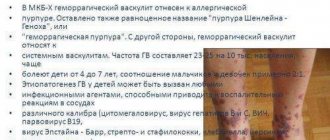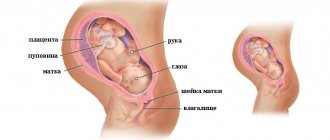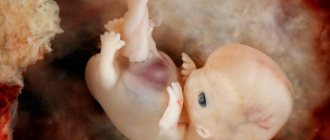What is toxicosis?
Toxicosis is a Greek word meaning “poisonous.” In scientific terms, this is endogenous intoxication of the body during pregnancy, as doctors say - gestosis.
The liver, kidneys, intestines and skin cannot cope with the neutralization of toxic metabolic products of the mother and fetus. These substances accumulate in the blood, causing poisoning of the body.
Scientists believe that the main causes of toxicosis are liver and kidney diseases of a pregnant woman.
How does toxicosis manifest itself? The stages of pregnancy at which it is most likely?
If the expectant mother develops weakness, nausea, dizziness, and severe salivation, it means that she has developed early toxicosis of pregnancy. Less commonly, intoxication of the body is manifested by skin itching and rashes.
The critical period when early toxicosis begins is considered to be the first trimester of pregnancy.
After the 12th week of pregnancy, that is, in the second and third trimester, late toxicosis may occur. This condition manifests itself differently from early toxicosis of pregnancy. But let's not get ahead of ourselves...
Fortunately, not all women experience such unpleasant sensations. Many were lucky enough to carry a baby and not know at what time toxicosis begins and how it manifests itself.
When does toxicosis end?
For some women, toxicosis accompanies the entire pregnancy.
Of course, all pregnant women who are faced with this disease want to know the exact timing of how many weeks toxicosis lasts, because this condition is very depressing and prevents them from enjoying their situation. But in this case, as well as in the question of how many weeks toxicosis begins, everything is purely individual.
If we are based on the reviews of the majority of pregnant women, then we can roughly indicate how many weeks toxicosis occurs in the first trimester. Usually this phenomenon continues until the placenta is formed, namely until 12-14 weeks of pregnancy.
After the formation of the placenta, it is she who takes on the main protection of the fetus from harmful and toxic substances and therefore the well-being of the expectant mother improves significantly. The situation with late toxicosis is more serious, and at what week toxicosis of the 2nd and 3rd trimester ends primarily depends on the effectiveness of therapy for this condition.
Important: Self-medication or waiting for gestosis to go away on its own is unacceptable. After all, the price of inaction in this case can cost the life of the child and threaten the health of the mother.
Toxicosis and Enterosgel
It is clear that drugs for the treatment of toxicosis must be safe for the fetus and effective for the expectant mother. Doctors know how to deal with toxicosis during pregnancy and use a detoxification method such as enterosorption.
During pregnancy, intestinal function is disrupted, dysbiosis occurs, and fermentation processes intensify. All this contributes to the accumulation of toxic substances in the intestines, their absorption into the blood and aggravation of toxicosis. Enterosgel captures toxic molecules, adsorbs and removes them from the intestines without causing any negative consequences.
Causes
Scientists believe that toxicosis during early pregnancy is a normal reaction of the body to substances that are formed during the growth of the fetus.
The reasons for the development of early toxicosis in pregnant women still cause a lot of debate in scientific circles. Each of the theories of the occurrence of toxicosis during early pregnancy has the right to exist. Let's name some of them:
Hormonal theory
During pregnancy, the concentration of ovarian hormones that support gestation changes. A woman’s body does not always have time to adapt to endocrine “restructuring”, to the period when early toxicosis begins.
Immunological theory
The embryo, attaching itself in the uterus, begins to produce its hormones, and the mother’s body perceives them as foreign substances, which manifests itself as toxicosis during early pregnancy.
Hereditary theory
A certain gene is responsible for the development of toxicosis. As a result of numerous studies, it was revealed that in 40% of cases, toxicosis in the first trimester was often present in blood relatives of pregnant women.
Psychogenic theory
Toxicosis in the early stages of pregnancy can be provoked by stressful situations, insomnia, overwork and excessive worries about future births. Negative emotions provoke symptoms of toxicosis!
Inflammatory theory
Toxicosis in early pregnancy (in the second and third trimester) is associated with chronic foci of infection. Due to the constant inflammatory process, the body does not have time to utilize toxic substances that accumulate during the life of the mother and fetus, resulting in intoxication.
Considering the reasons for the development of toxicosis in pregnant women, scientists consider the use of enterosorbents to be the main method of combating internal intoxication. The popular and safe sorbent Enterosgel adsorbs toxins from the intestines, reducing intoxication of the mother and fetus without interfering with the absorption of nutrients.
Toxicosis in pregnant women: manifestation of the disease
Toxicosis is poisoning. The fetus secretes products inside the woman's body. The latter begins to perceive the work of the fetus as hostile. As a result, symptoms of poisoning appear.
Signs of toxicosis in pregnant women:
- constant nausea and strong morning gag reflex;
- increased drowsiness;
- constant weakness and low performance;
- constant mood swings of a drastic nature;
- dislike of strong odors.
The pathology manifests itself during the first trimester of pregnancy. But not all women observe it. Why this happens - there is still no exact answer. Over time, the phenomenon itself disappears. But some people experience toxicosis in the late stages of pregnancy. This is a more dangerous form of toxicosis as it can negatively affect the course of pregnancy. Observation by specialists in a hospital will be required.
Symptoms of the pathology appear gradually after conception. At the beginning, loss of appetite and increased irritability are observed. The disease is gradually getting worse. But for one woman only a few symptoms are characteristic, and not all at once. And so for everyone.
Are you experiencing symptoms of toxicosis?
Only a doctor can accurately diagnose the disease. Don't delay your consultation - call
Symptoms of toxicosis
As a rule, toxicosis during early pregnancy is accompanied by nausea and vomiting.
By the way, a new study by American scientists has proven that women who experienced the hardships of early toxicosis were 75% less likely to have a miscarriage. At the moment, scientists continue to study this phenomenon. But let's return to toxicosis itself.
So, there are three degrees of severity of toxicosis:
- In the first degree, there is frequent urge, vomiting occurs up to 5 times a day, and weight loss of up to 3 kg is noted;
- The second degree is characterized by vomiting up to 10 times a day and weight loss of up to 4 kg;
- Third degree - frequent and prolonged vomiting, weight loss of more than 10 kg.
Severe toxicosis exhausts the woman; she is unable to do household chores or go to work.
Until the 12th week of pregnancy, when toxicosis passes, the condition improves, vomiting is no longer annoying and appetite appears.
How to get rid of constant toxicosis?
Usually, if toxicosis is mild, combating it is not required. Only if its manifestations interfere with a woman’s normal life and cause discomfort, you can try to stop them. Most often, it is enough to reconsider your diet and lifestyle, eliminating stress. Folk remedies can also improve the situation. In severe forms, it is no longer possible to do without medications.
Drug therapy
Drug therapy is carried out only in case of severe manifestations of toxicosis; the doctor is required to select a regimen. It will not be possible to completely eliminate the symptoms, but medications can eliminate the development of complications and improve the well-being of a pregnant woman. The safest medications are No-shpa and Valerian. However, if there is a threat of miscarriage, stronger means are also used.
Intoxication is relieved in a hospital setting using droppers with glucose, physiological and saline solutions. Cerucal helps eliminate the urge to vomit. Among other medications used, it is worth noting: Hofitol, Polysorb, Essentiale Forte and others.
Folk recipes
If toxicosis begins to worry, many mothers resort to traditional medicine, not wanting to use medications. The following methods, which are available to every woman, help eliminate nausea and vomiting:
- Lemon. It effectively prevents gagging. It can be added to tea or boiled water, squeezed into juice or eaten mashed with sugar.
- Mint. Peppermint tea with lemon balm or just mint candies will help you forget about severe attacks of nausea.
- A pineapple. Fresh or canned, in an amount of 30–50 grams per day, it will cope perfectly with nausea and vomiting.
- Fresh tomatoes. Suppress nausea, restore appetite.
- Rose hip tincture. Indispensable for severe toxicosis.
Nutrition and daily routine
A pregnant woman’s diet and daily routine play an important role in eliminating toxicosis in the first weeks. To begin with, you should switch to fractional meals. It consists of making small portions of food, but increasing the frequency of meals to 5-6 times a day. It is also important what a woman eats. The diet should be enriched with fresh fruits and vegetables, dairy products, herbs, cereals, fiber and protein-rich foods. You will have to give up fatty, smoked and fried foods, you cannot drink alcohol and carbonated drinks - they can irritate the gastric mucosa and cause vomiting.
As for the daily routine, a pregnant woman should sleep at least 8 hours a day. Walking is very useful - you should spend as much time as possible in the fresh air. Moderate physical activity is also not contraindicated, for example, yoga or walking. Any stressful situations should be avoided.
It is believed that the sex of the child depends on the severity of toxicosis. Is it true?
The opinions of ordinary people on this issue are also divided. Some believe that severe toxicosis indicates that a boy will be born. It is difficult for a mother to bear a child of the opposite sex. Others argue that severe toxicosis is a sign that a girl will be born. None of these versions has scientific confirmation.
Scientists from Denmark conducted a study that found no connection between toxicosis during early pregnancy and the sex of the child! Therefore, perhaps you should not take all folk signs seriously.
Expectant mothers often ask: “How long does toxicosis last? When will this torment stop? When does first trimester toxicosis end? »
By the end of the first trimester (12th week of pregnancy), the placenta is fully formed; it provides nutrition to the fetus and protects the mother and child from intoxication. Gradually, the symptoms of toxicosis disappear, and the pregnant woman’s well-being improves.
Another scientific fact: toxicosis occurs more often in multiple pregnancies, when twins, triplets and more babies are expected.
Why does toxicosis occur during pregnancy?
There are several reasons why an expectant mother may experience nausea and other signs of malaise. But gynecologists say that it is impossible to identify the true cause in a particular woman.
Reason #1 - Toxins
Toxins and harmful substances accumulate in the mother’s body, which provoke attacks.
Reason No. 2 - hormonal levels
After conception, a hormonal surge occurs. The body reacts to it - the emotional background changes. The expectant mother becomes whiny, gets offended over trifles, and gets irritated. She gets tired, constantly wants to sleep, and is plagued by bouts of vomiting and intolerance to smells and food.
Reason #3 - immune response
For the female body, the embryo is a foreign protein. And the immune system releases antibodies to fight it. The body tries to expel it - hence the manifestations of toxicosis. When the level of hormones stabilizes, the immune system gets used to the protein, the body begins to perceive it calmly - the malaise goes away.
Reason No. 4 - development of the placenta
When the placenta begins to form, it produces a large dose of the hormone hCG. He is the provocateur of vomiting. Another explanation is that at the beginning of its formation, the placenta retains toxic substances. The body tries to get rid of them through vomiting. When the placenta completes its formation, the attacks stop.
Reason No. 5 - the body's protective reaction
Some foods can be harmful to mother and fetus. For example, meat, coffee, eggs. And the body, through the gag reflex, prevents them from entering the body. This also includes cigarette smoke.
Reason number 6 - chronic illnesses
These include infectious diseases, disorders of the thyroid gland, liver, gastrointestinal tract, and biliary tract.
Reason number 7 - mother's age
Women who are expecting their first child at the age of 30 years and older are at risk. Such mothers have a harder time with toxicosis.
Reason number 8 - multiple pregnancy
Women who have two or more children are more prone to illness in the first trimester.
Reason No. 9 - hereditary factor
If a pregnant mother had toxicosis, then with a 70% chance she will also have it.
Reason No. 10 - psychological factor
Toxicosis may return in the 3rd trimester if a woman is too worried before giving birth. The nervous system of the expectant mother changes during pregnancy; areas of the brain that control the function of smell and the functioning of the gastrointestinal tract are activated.
Reason No. 11 - activation of the subcortical parts of the brain
They contain centers that are responsible for protective reflexes - the centers of touch, salivary glands, stomach, smell, and vomiting center. They become more active and the pregnant woman begins to feel unwell.
Nutrition
Pregnant women with early toxicosis should first of all pay attention to their diet:
- eat food every 2-3 hours in small portions;
- when toxicosis begins during pregnancy, food should be easily digestible;
- you can’t eat through force;
- It is necessary to exclude fatty, fried foods from the menu;
- what to do if you have toxicosis - you will have to give up chocolate;
- drink up to 2 liters of liquid.
Toxicosis during early pregnancy will be reduced by the following products:
- lean varieties of fish and meat;
- dairy products;
- cereal porridge;
- fresh fruits and vegetables;
- fresh juices.
How dangerous is toxicosis?
Mild early toxicosis does not pose a threat to the fetus. If, due to constant vomiting, the mother ceases to receive the required amount of nutrients and suffers from disturbances in water-mineral metabolism, then the health of the unborn baby is at risk.
Late toxicosis poses a great danger to the child, although at the initial stage it may not cause severe discomfort to the pregnant woman. Subsequently, the woman’s blood circulation and metabolism are disrupted, tissue oxygen starvation occurs, and the child ceases to receive the nutrients necessary for development and life. There is a threat to the life of the fetus!











